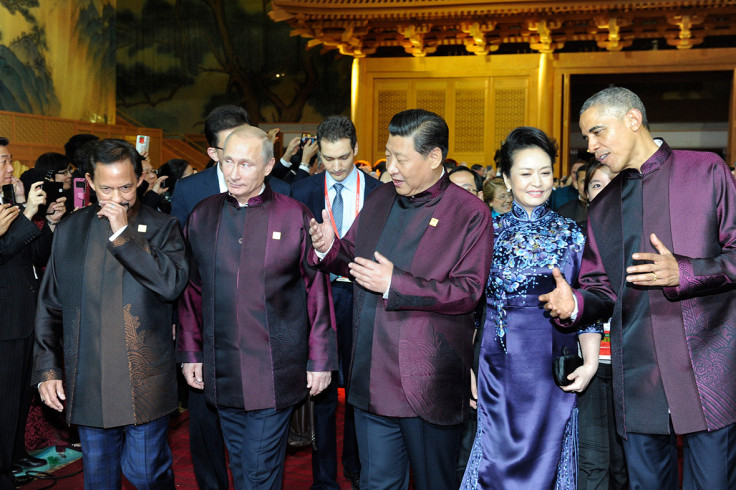Apec Summit 2014: China Takes Lead in Move Towards Free Trade Agreement

Twenty-one world leaders have signed up for China's roadmap towards a free trade agreement spanning the Pacific Rim.
The move was announced by Chinese President Xi Jinping during his closing remarks at an Asia-Pacific Economic Co-operation (Apec) Summit which has served up a number of high-profile trade developments.
Speaking to an audience that included US President Barack Obama, Xi said: "I believe our discussions today are of great significance. We can say with pride that we did the right thing."
Apec members have agreed to launch a two-year study into the feasibility of the Free Trade Area of the Asia-Pacific (FTAAP) which the Apec says will "contribute significantly to regional economic integration, sustained growth and common prosperity in the Asia-Pacific region".
Xi attempted to quash speculation that the FTAAP would override the regional agreements currently under discussion: the US US-backed Trans-Pacific Partnership (TPP) and the Chinese-supported Regional Comprehensive Economic Partnership (RCEP). "The FTAAP does not go against existing free trade arrangements, which are the potential pathways to realise the FTAAP goals," Xi said.
Both of these regional deals would be, in essence, stepping stones towards an Apec-wide agreement. But by taking the lead on FTAAP, China has made a clear political move at a time when TPP negotiations are laboured and when the US is facing a fight on home turf to pass the trade promotion authority (TPA), which allows for the fast-tracking of free trade agreements through Congress.
"FTAAP has always been the prize for the Apec," Dan Ikenson of the Cato Institute told IBTimes UK. "But China is planting the seed among other countries, asking: are you tired of the long negotiations around TPP?"
For some, the announcement around FTAAP is tantamount to China rivalling the US for free trade supremacy in the Asia-Pacific region.
In an editorial for the World Economic Forum, the Lead Economist at the Asian Development Bank (ADB) Jayant Menon wrote: "The race is on between the US and China to dominate the rules-setting game for trade by being the first to be able to announce plans for a free trade area in the Pacific Rim."
Dr Matthew Rimmer of the Australian Research Council, told IBTimes UK that the fragmented nature of the trade agreements is "symptomatic of the breakdown in the WTO between the US and China. Ideally, the multilateral trading system is the best place to deal with such sweeping trade issues."
A number of countries are in pursuit of all three of these trade agreements and Australian Prime Minister Tony Abbott has spoken of his hopes of consolidating the three agreements as one.
"Personally, I am not sure that can happen - given the radically different nature of the agreements. TPP seems to be promoting standards above and beyond the existing trade regime. "RCEP and FTAAP do not seem to go as far," Rimmer said.
The other side of the coin, arguably, is that for the likes of Australia, New Zealand and Singapore, which are all looking to negotiate all three agreements, could benefit from having both superpowers grappling for influence in the region, since it may increase their ability to negotiate better deals.
The FTAAP is not a new thing – it was first mooted back in 2006 and has been mentioned at every Apec Summit since. However, that China has made moves to get the ball rolling is indicative of its growing appetite for dictating international policy.
On the eve of the summit, China agreed to enter into a comprehensive free trade agreement with South Korea, which is expected to be concluded in 2015, and which will remove bilateral tariffs on 90% of goods over the next 10 years.
On 10 November, China and the US agreed to eliminate tariffs on a host of technology products – a move which could add $190bn to global GDP.
The two trading powers overcame a succession of longstanding disagreements over the Information Technology Agreement (ITA), an existing trade deal which represents 97% of the world's trade in IT products.
© Copyright IBTimes 2025. All rights reserved.






















